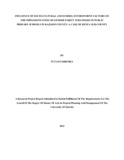| dc.description.abstract | The Global initiative of education for all to which Kenya is a signatory promotes gender parity in
schools. However, despite the initiative and government attempts to improve gender parity in
primary schools, gender disparities still exists. This study was an attempt to investigate the
factors that affect the implementation of gender parity strategies in primary schools in Kajiado
County. Specifically the study investigated social, cultural, economic and school environment
factors affecting the implementation of gender parity strategies in public primary schools. The
study will use a descriptive survey design. The study targeted primary teachers, head teachers,
quality assurance officer and the District Education Officer (DEO) in Kajiado district, with the
sample size derived from a population of 290 teachers, 24 head teachers, one quality assurance
officer and one DEO. The study sample was 186 and this included 165 teachers, 19 head
teachers, 1 DEO and 1 quality assurance officer. The study used stratified sampling, simple
random sampling and purposive sampling to collect data from target sample. Pilot test was
carried out to establish the validity and reliability of the research instruments. Questionnaire and
informant guide were used in the study to collect data. The data collected was edited and
analyzed using SPSS and content analysis. Data was analyzed through frequencies, percentages,
themes and cross tabulation. The results were presented through tables, frequencies, percentages
and themes. The findings of the study revealed that majority of the teachers believe that
individual factors (62.1%), home based factors (82.8%), traditional practices (83.5%) and school
based factors (73.8%). The study findings also indicate that minority of respondents believe that
lack of involvement of parents and lack of funds for supervision are also factors that affect the
influence the implementation of gender parity strategies. The study concludes that individual
factors, home based factors, school based factors, traditional practices and economic factors are
factors which influence the implementation of gender parity strategies. The study recommends
that there is need for all stakeholders’ involvement in addressing the factors that affect the
implementation of gender parity strategies in schools. Finally there is need for comparative
studies on factors affecting gender parity in both urban and rural schools. | en_US |

